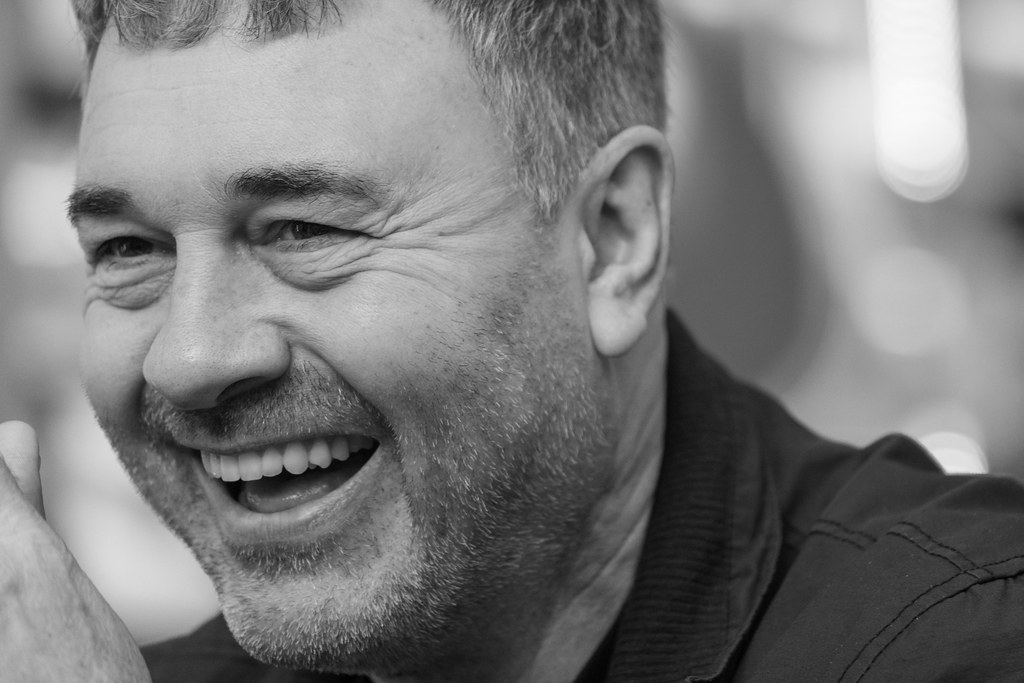
(Versión en español aquí)
People say that succeeding with the publication of a first work can become the worst burden for a writer. Whether this is true or the justification of the most envious, Richard Morgan (London, 1965) does not seem to have fallen into this trap. After the appearance of Altered Carbon, he has not stopped working on multiple novels, comics and video games without losing the public’s attention. The icing on the cake came from the hand of Netflix and the production of the series of that first work, a cyberpunk noir with a lot of transhumanism and interesting reflections on immortality or the limits of the self.
We take advantage of his participation in the first edition of Festival 42 to lock him in the Librería Gigamesh and ask him about his life and work, and without realizing it we see ourselves arguing about the relationship between neuroscience and philosophy, the failure of the Labor Party in the last elections or the circus that the Musk, Zuckerberg and company are putting together with their idea of turning classic science fiction into realities perhaps too far from, well, reality.
You’ve been in Barcelona these days as one of the big names at Festival 42. Although you were already a well-known author since the publication of «Altered Carbon», has the Netflix series put you in the focus of the mainstream?
Yes and no. I mean, yes in the sense that while the show was live, you know, when it first launched and it was being marketed and so forth, I got a lot of mainstream attention. I was interviewed by the Guardian and various other broadsheet newspapers. You come to the attention of the world when something like that happens. So that was nice, but it didn’t last. Media works that way towards the next thing. So that lasted for most of 2018 but by the end of the year it was already starting to drop again. There were questions about whether there was going to be a second season of the show. Also the show got mixed response from the critics. Generally people who watched it loved it, but the critical response was certainly mixed. And then I was again just a well known science fiction writer. It still works for me when I meet people at parties. That gives you a kind of general visibility that I think books will never do. I think that’s just about screens. Anything that’s video entertainment such as a video game or a movie or a streaming show… the footprint of those occupies so much more than any kind of novel. I had people ringing me up and saying, ‘Oh I was in Calcutta and I saw this huge poster of Altered Carbon’. In that sense, screen entertainment always has the edge. It’s sexier. It’s more impactful. It reaches a wider audience and as a writer, you’re aware that you’re sort of the poor cousin of the family.
But there is hope for writers. We have arrived at an age where fantasy and science fiction are becoming very popular.
This is the triumph of the nerds. When I find a critic for the New York Times or somebody who will still say ‘oh… yes… science fiction… mmm…’, I think, ‘man, you are like these Japanese soldiers that they found on Pacific islands in the 1960s who still thought that the war was going on. I’ve got some really bad news for you: The war has been over for 15 years and you lost’. That is the reality: genre dominates effortlessly everywhere you go in video games, in movies, in TV, and increasingly in literature as well. Literature was the last castle to fall. But still, even now the big names of literary fiction, people like Margaret Atwood, are very much embedded in science fiction as a concept, and increasingly a lot of the young writers who are coming into the literary field. They’re coming with a science fiction sensibility. What they write, although it is literary fiction, will have all these elements that have been borrowed from the genre, from fantasy or from science fiction. It’s a total victory. It’s a wipeout.
But let’s start from the very beginning. When did you decide to write the first word of your first story?
I’ve been writing as long as I have been able to write. I remember very clearly when aged 11 I was saying to my classmates ‘when I grow up, I’m going to be a writer. I’m going to write books, and write stories and get paid for it’. So it’s been at least since 11 and before that I remember several years of scribbling stories in my school notebooks and things like that, so I think pretty much my whole life.
For many authors it is a burden that their first published novel is a success because they fall in the sensation that it is going to be difficult to improve it. But it doesn’t seem like that was your case.
No, it was a mixture of being very lucky and I would say very unlucky. The way that I behaved took me a very long time to break in. I began seriously trying to write something that might get published when I was about 20, and Altered Carbon was accepted when I was 34. I had nothing published in the interim, absolutely nothing. That was partly me. I always ignored suggestions from magazines when I sent short stories and were rejected. Sometimes the suggestions were stupid. I remember submitting the short story that my novel Market Laws is based upon and I remember I received a rejection letter where the guy said something like ‘you write very well but I couldn’t sympathise with either of these selfish yuppie characters’. That’s kind of the point. Sometimes they were wrong, but a lot of the time these guys were giving me advice that was valuable and I just didn’t listen to it. And that’s one of the reasons I spent so long in the wilderness. But then what happened? I had so much time refining my art writing and rewriting, so when I finally had something, that was up to the necessary level. It was really pretty good. So it was quite polished by the time it actually was accepted for publication. It was a weird feeling, like I’ve been standing in front of this door banging my head for 14 years and suddenly the door burst open and I fell flat on my face onto this beautiful red carpet. I spent a long time in the wilderness but I sort of jumped the middle stage where you have to work on your own and get better and better and reach a point of major success. That was a dream coming true.
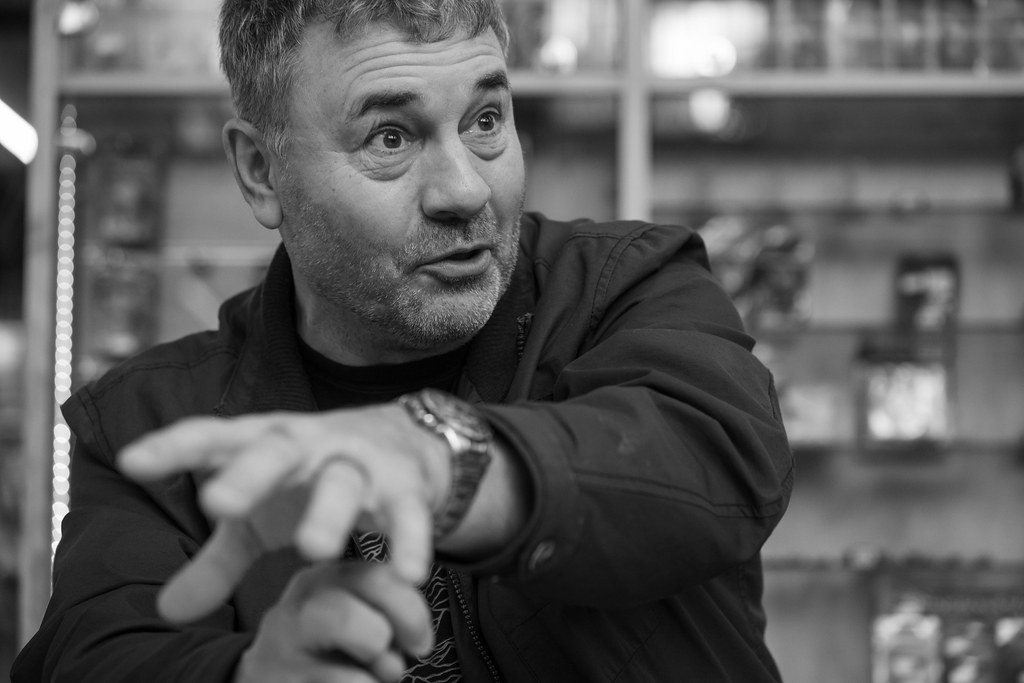
How was Takeshi Kovacs born? Did the character come first, an idea of the story or the world in which it takes place?
I think there was a character not dissimilar to Kovacs before the story of Altered Carbon. I’ve been writing sort of short pieces that again never got published and I’ve written this hard boiled sort of chandleresque character. He wasn’t very well formed. I mean he’s not Kovacs as he is in novels, but something approaching Kovacs. And then I had this argument with the Buddhist in a party in London where we’re talking about reincarnation and you know the Buddhist idea that if you’re suffering it’s because there’s a karmic balance and it’s balancing out things that you did badly in a previous life. I think of all the major faiths, Buddhism is the least full of shit. And I say, ‘well, hang on a minute. So what you’re saying is that I’m suffering here in this life. And the reason I’m suffering is because of things that I did but I don’t remember. And in fact the person who did those things wasn’t really me. But you can say it’s the same essence, the same soul. But it wasn’t me cause I don’t have any memory of that. That’s not fair’. What really stuck with me was this idea of to what extent can you be responsible for things that you don’t remember. This is literally a live issue. When I was living in Glasgow I knew a guy who worked in the law faculty and he had invented a job for himself, basically because he started wanting to study, research and teach bioethics. And one of the areas that he was very interested in was Alzheimer’s because he was saying, suppose that you know that you are going to develop Alzheimer’s, and suppose that you sign an affidavit that says at certain point when I’ve reached a certain level of the disease, I want you to take me to Switzerland and euthanize me. And he said this is problematic because that as far as we can tell, by the time that happens, that person is not you. So much of who you were is gone as just been destroyed by the disease. Are you dealing with the same person, or is this a different person? We don’t know how to answer that question. That whole idea of to what extent can we be responsible was what really drove the plot of Altered Carbon. But luckily I had a protagonist already at hand. Some version of Kovacs came first, but he was really forged in the specifics of the story as well.
Consciousness and the self are very related to remembering. Are we our memories?
Yes, we are. That’s the problem. We are what we’ve done basically and what we recall and it would appear from what we’ve now learned that we are constantly re editing our memories as well. You look back and you think you remember something but it turns out objectively probably you don’t remember it all that well. So we are in freefall here. It’s a really fascinating, slightly scary area.
Memories are fictions created by our brains.
Exactly! And the problem is that it’s beginning to look like consciousness is a trick. We don’t really exist. We are a trick created by our physical self to give us continuity.
You talk about self in philosophical or neuroscientist terms?
I think the problem we have now as a Western culture is that we don’t seem able to unify our philosophical and sociological thinking with what the hard data is telling us, and this is really bad news. It was okay to have these vague philosophical and sociological ideas when we didn’t really have any alternatives. But we are now starting to find out very, very hard facts about how we work and philosophy and sociology guys are in denial. And that’s a problem, because if your decisions are based on bad or non-existent data and you continue to ignore the good data, you’re heading for a crash and I think that’s where we are at the moment. I think philosophy should be neurologically based. We’ve got to base it on neurological science because what else is there? If you have this philosophical idea of how humans can and should behave but you’ve not built it on the neurology of how the human brain and consciousness actually works, it’s useless. It’s worse than useless, it’s actually going to drag you up in the wrong direction. I would like to see a unification of science and the softer subjects and to get those idiots to finally agree. Well, they don’t even have to agree, they just have to fucking come and look at it. They’re running away from it because they don’t like what it has to tell us. Science will always tell you uncomfortable things, and you can’t ignore it. This is one of our biggest failings as a species, our ability to completely ignore what’s right in front of us. I’m with Robert Heinlein on this one: ‘Get the facts!’.
You’ve mentioned a crystal moment for you reading William Gibson short stories in the 70’s and 80’s. The influence of Gibson’s noir and science fiction mix is clear in the Kovacs trilogy. Raymond Chandler in the cyberpunk world.
Because that’s basically what Gibson had done. Although he now maintains that he never liked Chandler very much. He’s very much a Dashiell Hammett fan. But yes, they were calling Gibson ‘the Chandler of science fiction’, so I’m like ‘who’s this guy Chandler?’ Then I started reading Chandler and from Chandler I then moved onto all the ones who inherited Chandler’s style. And then I could see something that I already knew. I already knew that the Gibson stuff was powerful but I didn’t know why. And then when I read the noir stuff, I was like ‘that’s why it’s powerful, because of his understanding of human behaviour’. I think that was the thing for me. I knew Gibson had got something and it was something very powerful. And when I started reading noir and I understood why it was powerful I never looked back.
Your first book was published in 2002. When did you start playing in other leagues as comic books or video games?
The comic book came about two years after the book was published, I think 2004. Basically due to Marvel editor Jenni Lee. She read Altered Carbon and really liked the female characters in it so she came to me and said would you like to do some work on this Black Widow character? So that was 2004 and I did it for about two years. And that was a lot of fun. I really enjoyed it. We didn’t sell a lot of copies because it was not a popular character. Again, it is interesting because it was critically well received, but the core readership didn’t like what I’ve done with it at all. Once I was gone, they brought in some other writers that quickly erased the directions that I was going in and moved back over to the sort of the same old Black Widow. The video game thing was quite similar. It was about 2008 when these guys from Electronic Arts who again were fans of the Kovacs books just rang me up and said, would you like to come aboard and help us with a game we are developing? Then I had this period of about three, maybe four years where I was like a sort of hired gun for AAA. It was very well paid. It was a very different kind of work to writing novels, so I really enjoyed that. But obviously my novels suffered because I literally didn’t have the time. All this stuff has come literally in the nicest possible way in that someone will basically ring you up and ask you would you like to do this? And you get to say no… no… oh yes!
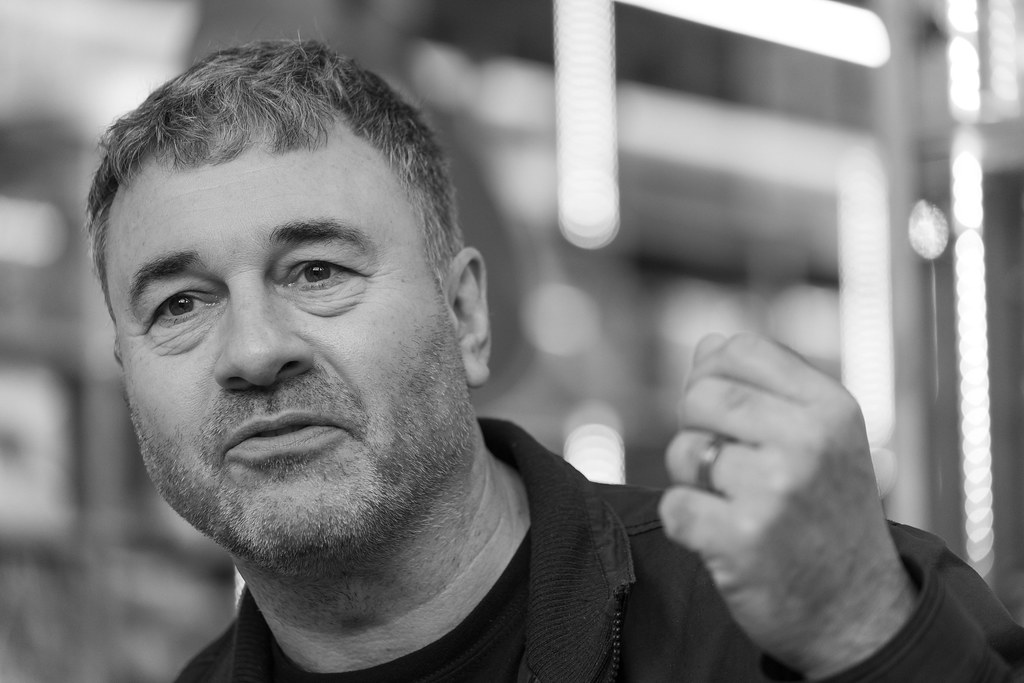
Writing is mainly a solitary activity, but not so much in the case of a graphic novel, much less in a video game.
Yeah, absolutely. Novels are the loneliest profession. Comic book writing is still pretty dispersed. It’s very rare that you would actually be in the same city as the guy who’s doing the artwork and the pencils. In my case with Black Widow I was in Glasgow, the pencils guy was in Zagreb, and Bill Sienkiewicz was somewhere in Massachusetts. It’s still distributed, but there was at least that sense that we were collaborating on something. In video games you are constantly in meetings. You’re constantly going back and forth with the other department. And then there is the extent to which your changes are important. In a novel it’s just you. In comic books you’re still pretty much the important, but maybe you’re not the biggest name on the bill. And then when you come to video games, you’re essentially providing a support service because the video games narrative is important but it is a pillar to support the gameplay. It’s actually the game dynamics that matter in a game and you are there to enhance them by providing some kind of emotional engagement and some sense of what you’re doing matters, which most games need. I think the video game industry has been on this long journey and still is in the process of realizing that story matters. Now you’ve got this contingent within the gaming community in open worlds who don’t want any kind of constraint, and they don’t want to be told to do certain things. But in the stories that really work, the games that really take off like the Far Cry series, for example, there is a rooted narrative, and that narrative is a big part of what drives the game. At the same time you’ve got people like Naughty Dog who are bringing out The Last of Us, and it’s an extremely curated experience because they are not going to let you be looking the wrong way when something emotionally important happens. There is this kind of kickback against story all the time within the gaming community, but I think we’ve reached the point where now everyone accepts that you need it. I’m now working with Gunzilla Games who are making a multiplayer shooter. And again we’re looking at narratives as an important feature of the multiplayer shooter, which is a challenge.
From a video game creator perspective, what do you think about ideas like Facebook’s Metaverse? Do you think it’s little more than a Neal Stephenson tribute or is it the natural step in our society?
This is coming. There’s no getting away from it but I don’t really think Zuckerberg is the guy. My worry about tech is that it seems to be in the hands of a small group of weird people who are often very much disconnected from what I would think of as normal human experience, and unfortunately they have this colossal financial and economic power. The decisions they make are very often bad decisions because they just clearly are not mature enough, not neurotypical enough maybe to see you what the human condition is. Elon Musk is another case in point. There’s this obsession with space and Mars. And it’s like, good, let’s go to Mars, let’s see what is there. Let’s see what that brings back in terms of useful science and development and support. But what’s the point of going to Mars to live? Musk has this vision of the Golden Age science fiction of man going out into space. Wouldn’t it make much more sense if we just sent machines cause our IT Tech is pretty good these days? I can see us building on the moon. I can see us going to Mars. But I still think the smart move is that most of that is done by machines. Why would you go? You know what? It’s so horrible there! I remember Bruce Sterling saying that Mars is about a million times less hospitable than the Gobi desert. And you don’t see people rushing to colonise the Gobi desert. No one wants to live there. So why do we want to live on Mars? Guys like Musk don’t seem to get that. They don’t. You know there’s something missing there. There’s some lack of perspicacity. I actually had a very brief exchange with Musk on Twitter before I got kicked off Twitter, but that’s another story. But I had this very brief exchange with Musk where he was talking about his political thoughts in terms of the Iain Banks novels. Dude, that’s fantasy! Even Banks himself didn’t think of it as real. And if something like that ever were to emerge, you’re talking thousands of years in the future. This is something that humans won’t be able to do for 2000-3000 years probably. To base your political ideas on something like that is scary for a man with that much power. And I did say to him I really respect the tech achievements that you’ve made, but this is like someone walking into SpaceX and saying, okay, so where do we put the photon torpedoes?
Facebook’s Metaverse comes from Snow Crash ideas where people start to be close to living longer in virtual worlds than in the physical ones. How do you think that could affect us?
I think it’s going to be a while before you could literally choose to live virtually and sort of leave your body behind. And again the question remains, what do you do with your body? Because someone’s gotta clean it and make sure that it doesn’t atrophy and so forth. We are physical beings. Despite Altered Carbon I’m very much a materialist in that sense: You are not in your body, you are your body. So my question is always going to be ‘okay, so you go into your virtual space and you really like it there because you can look like Brad Pitt or Angelina Jolie. And you can live forever and do whatever you want, but you’re still a physical entity back in the real world. Who’s going to care?’ It’s great if you’re Jeff Bezos or Zuckerberg because you’ve got so much money you can pay a cohort of medics to just make sure your body is okay. But that’s not accessible for humans in general, so you’re going to face the issue of what about maintenance. With science it’s always a question of ‘yes, but who’s going to clean the toilets?’. It is a very interesting issue, especially with the rise of feminism, because obviously the answer to that question has historically been ‘women’. That’s going to have to be addressed. And at a more philosophical level, do we really want that? We are physical entities, and do we really want a future in which we try desperately to disown that? Wouldn’t it be better if we pay more attention to our physical selves or we look to keep ourselves in better shape, we eat better…? The good life if such a thing can be said to exist is going to come from a revision of how we live physically. The whole virtual thing feels like retreat. It feels like I can’t cope with the physicality of the universe, so I want to go and hide in here because here I get to make up the rules. At the most basic level, I think it’s cowardice and it worries me what the social implications of that might be because it will be like the macro version of the fact that when I look at a news now, I’m as likely to see a news headline about a new Netflix show as I am about a famine in Ethiopia. It’s literally reached the point where entertainment has become as or more important than stories about what’s actually happening in the world. And this is the nightmare macro iteration of that, where we won’t worry about the approaching asteroid or whatever, because we will be too busy experiencing our new virtual series or programs.
Scientists sometimes know what to do, but don’t think why they have to do it.
It’s Jurassic Park, isn’t it? You were so busy trying to know how to do it that you never asked yourself if you should do it. I think Hollywood is extremely conservative in this respect, and there’s always this terror of new technology. I think that’s the wrong line. We are a technological species. Everything that’s made us is our technology. Technology is us. We can’t ignore it. We seem to be in full retreat from it and that really scares me because usually that’s that way religious wars lie. I think climate change is real and it’s going to be a big problem in the future and we are starting to finally understand. And we don’t seem to have the political will to address a lot of the inequities that we’ve got at the moment. We’re facing the resurgence of what is essentially fascism in China, in Russia, in other places as well within the European Union even, and all of this makes people uncomfortable and the problem is in rather than facing that and saying shit, we have to do something constructive about these things, however hard that may be, we seem to be in full retreat. It’s always too difficult, it’s too complicated, I don’t want to think about it, and you know, that’s late stage capitalism. Don’t get me wrong, capitalism is a great engine, you’re not going to catch me with a placard saying smash capitalism. It’s the best engine we’ve got, but I do think the problem with late stage capitalism is that having satisfied basic needs, it now goes on to satisfy whims and we are being told that we should never be uncomfortable. Are you hungry? Eat this snack. Are your children bored? Let them watch this thing. There’s always a fix for your discomfort, and I think that a large part of the human condition is discomfort. If you take that away, you end up with a kind of unmoored detached human, someone who doesn’t really understand what the human condition is. That’s what really worries me. I see no signs of it changing, because obviously capitalism is a great engine, but we have turned it on and then just let it run and we’re not doing enough to think of it, because unfortunately again, it’s dumbing down. It’s that understanding of it’s a thing we’ve developed and we now need to make sure that it’s properly administered and regulated because that’s what you do with everything. We don’t build cars without safety features because ‘hey, it’s the internal combustion engine man, you know, don’t slow it down!’. It’s that kind of thinking, but with any other form of science, any other technology, it would be considered insane. Build nuclear reactors. Don’t worry about such security protocols or shutdown systems. It is all about a basic refusal to accept complexity and to accept discomfort. One of my favourite moments anywhere in any novel that I’ve read is not in a science fiction, it’s a crime novel by Lawrence Block. He is a New York crime writer and he wrote a series of novels about Mathew Scudder, a cop reformed alcoholic character who lives in New York. Most of the books this guy goes to Alcoholics Anonymous meetings, and there’s this brilliant bit where he goes to a meeting and this woman is there and she’s having her little talk to the circle. And she’s saying it took me 37 years of my life to understand that there is no law that says I must be comfortable at all times. Every time I was uncomfortable I would take a drink. And she said eventually I understood discomfort won’t kill me and I have to face up to my discomfort and deal with it. I remember reading that a few years ago and thinking that’s almost the perfect snapshot of what was wrong at the moment. We’ve lost the preparedness to endure discomfort and to be uncomfortable to understand that actually there are no good choices here. To pick the least bad one. One of the reasons that the Labour Party lost the last election in Britain was because no one had faith in Jeremy Corbyn as a leader, or no one who was older than about 15 because he was literally incapable of facing bad things. So, when the question arose of the fact that there’s perennial unemployment in areas that used to have mining communities, he actually was talking about reopening coal mines. Man, we’ve established that coal mines are a really bad idea, ‘Oh, but these people don’t have jobs. Maybe we should consider pumping out the water from the mines’. No! With nuclear submarines there was the question of whether Britain renews its nuclear deterrent. He’s anti-nuclear, but he said there’s a lot of jobs for shipbuilding and he honestly said perhaps we could build the submarines but not put nuclear missiles on them. Man, if you become Prime Minister of this country, everyday you’re going to face situations where there is no good choice. Where the choice is just the least bad option and you’re going to have to compromise and you’re going to have to do things that you would really rather not do, and it’s because that’s how politics works. And unfortunately he had a big following, especially among young people. It’s the nice party, we are in favour of nice things and we’re against bad things. I personally think we’re in a problem of extreme immaturity. And someone has to get in the driving seat. We have to get control and go back to the physical truths about who we are. But before people who have the knowledge to do those things can do it, you need a general will from the population. You need to elect them. You need to appoint them. You need to pay them taxes. That will fund them. These things have to happen and in order for that to happen the western world has to wake up. It has to stop with this sort of pampered rose tinted vision of how things should be. But I’m not hopeful.
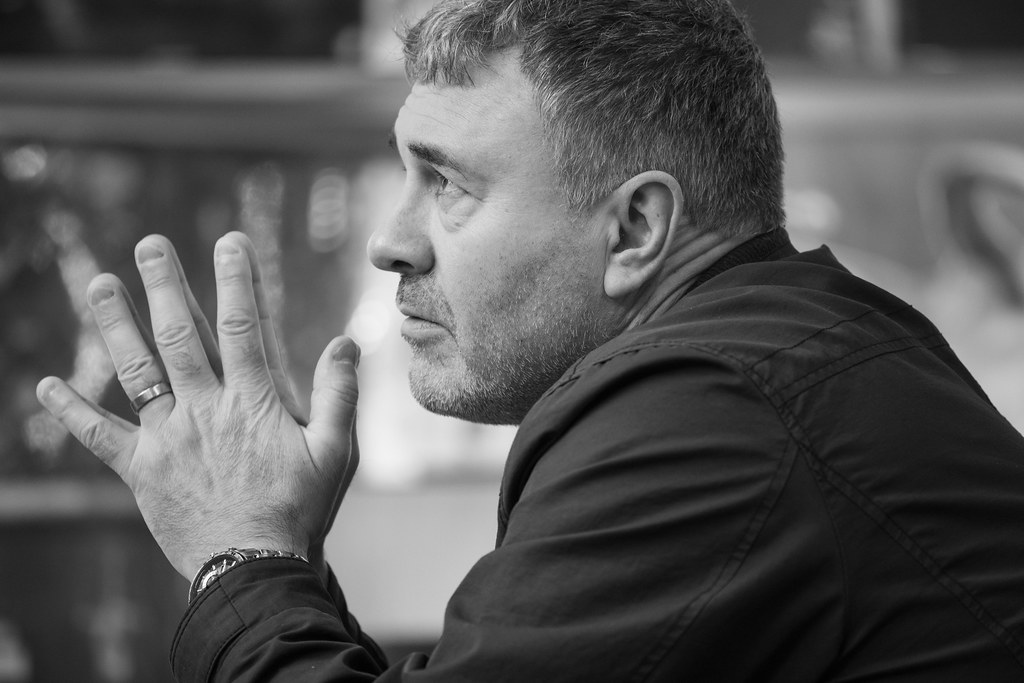
‘Market Forces’ is a dystopian novel where you’ve made your more obvious criticism of the capitalist system and neoliberalism.
Market Forces was literally the attempt to say, ‘Let’s take the brakes off so nothing matters now except market share and profitability and revenue. So let’s see what that would be like’. It’s a physicalization of the metaphor into a world. That’s probably, as you say, the closest I’ve come to the sort of very basic open critique.
The use of the violence in this novel has been very criticized. Seems close to the reception that Michael Haneke had with Funny Games. Both of you show how real violence is and also its consequences. Something you miss in superheroes movies.
Absolutely. The whole superhero thing is full of violence, but it is quite literally cartoon violence in the sense that there are no consequences for it. Everybody is so superheroic and armoured that you can have a building fall on you and it’s not a problem. It is interesting because for me, as a narrator, as a storyteller, I look at those films and I’m like ‘There’s nothing here’. When Scorsese had his criticism, everyone jumped on his neck but he’s absolutely right. This is not really a narrative form, it’s a theme park ride. This whole massive superhero blockbuster thing has contaminated the storytelling water table. In almost every movie of this sort one of the characters will actually say ‘Let’s go save the world’. Man, that is subtext! You don’t need to fucking say it! But they do need to say it because you don’t trust your audience. You don’t trust them to be smart enough to work things out. And also the fact that everything has to be about saving the world. One of the great things about the original Blade Runner as a movie, was that it was actually about five or six people and what happened to them. The themes are immense, the themes are overarching and concern everything about, but they are seen through the prism of the very personal experiences of a very small number of people and that’s what is brilliant about it. We’ve kind of abandoned that. We seem to lack the confidence to be able to tell that kind of story where what the hero does at the end is he survives and gets his girlfriend out, and that’s it. But now it always has to be about you’ve got to save the world.
‘Noir is the opposite of Disney’, said somebody in the audience when you were trying to define the term ‘noir’ in a conference.
Ali Karim, yes. He nailed it. I’ve never seen it better expressed. Noir accepts that it isn’t going to be alright in the end. At best you can survive and maybe do a tiny little bit of good. The way I tend to phrase it is you might get out with your life and you might carry someone out of the wreckage on your shoulder maybe, but that’s about it. Beyond that what you can achieve as an individual is extremely limited. Noir understands that and Disney desperately tries to deny it. Which would be fine if Disney was still entertaining kids, but it’s not. It’s become entertainment for the whole population. It’s no wonder that China has embraced it because they love that shit. It completely disconnects the population from any sense of ground of street level consequence. I still remember Hero, a Chinese movie where basically the whole movie is ‘yes, I slaughtered your family but you know they’re in the way and I’m the Emperor and it had to be that way’. And at the end he goes ‘Oh okay, that’s a good point. Yeah, fair enough’. Sorry? I couldn’t believe it when I got to the end of the movie and I’m like, really? That’s where you’re going to leave this? That’s a narrative that suits autocratic regimes very much. If you can stop people thinking it is then very easy to control them. It’s interesting because I was on a panel last night and there was an argument about whether it is the future of science fiction cyberpunk or is it solarpunk. Is it positive or negative. And we all pretty much agreed that it was much more complicated than that. Good imagined futures are textured and you’re going to have a bit of this, a bit of that, and it’s never going to be just one thing or the other. Almost everyone on that panel agreed on that point. The moderator’s still kept pushing this. ‘Oh yes, but you know we must have a new vision. We’ve got to go forward with a new way of seeing things’. And I’m like, ‘no, we’ve just explained to you why you can’t do that, we just explained that it will never be that simple’. But they continue to push that narrative and I think it’s a problem that originates in society. The economics thing gives you the sensation that your whims and desires are important. It reinforces that subjectivity, that centre of almost solipsism. What matters is me. And then social media just enhances it, it is a machine for reinforcing that loop and then you end up with these incredibly self involved people. Scary stuff.
Genres are becoming market trends.
It’s bizarre. There was never a manifesto for cyberpunk, it just emerged. Where is the other side of the equation? There are these constant manifestos. There was an anthology of stories, all super positive stories about technology, and so that was a manifesto. And then there was the Mundane Manifesto. And then there’s a solarpunk thing… and it seems to me that those are all confected, constructed desires. It’s like we want a fiction that does this, this, this, and this. Before cyberpunk and noir nobody sat down and decided what that should be. They just wrote what they felt. The guys who wrote the noir stuff, a lot of them had come back from the war. Chandler was in the First World War. Hammett was in the First World War. These are guys who’ve seen the worst that humanity can do and came back and wrote something that sort of interpreted that. But it wasn’t a manifesto. I always feel that when this argument comes up it’s unequal in the sense that on the one side you’ve got people with an agenda and on the other side you’ve just got people who are like, ‘well, this is how I see things’.I get very impatient with the agenda people. It’s not a product. Novel becomes a product, but it’s not a product. If it’s good, it’s someone’s guts coming out on the page.
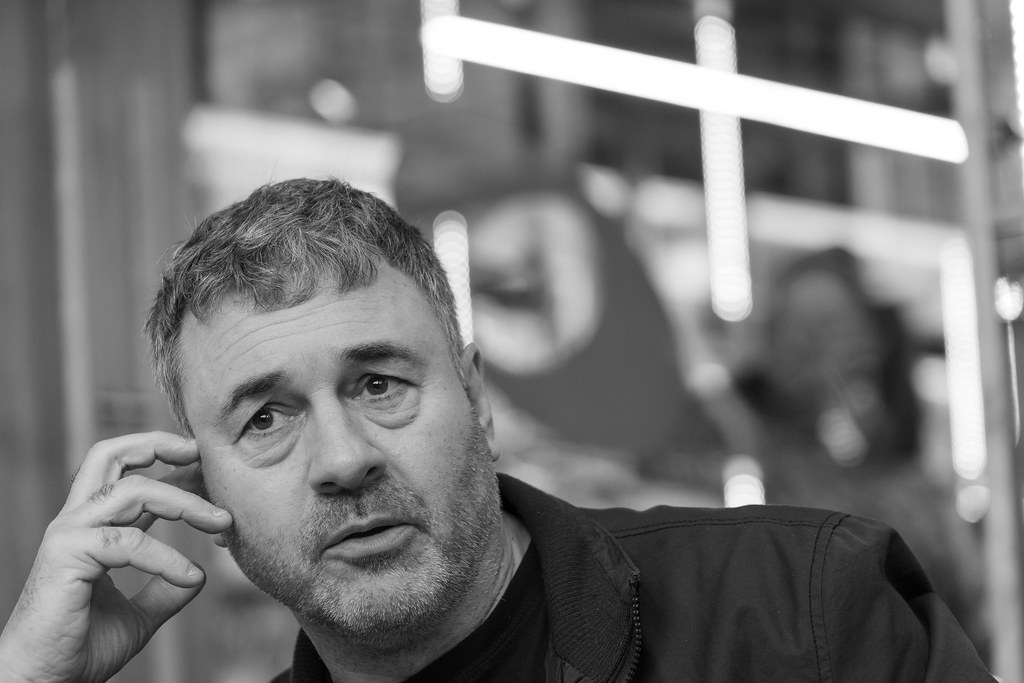
You’ve made me think about Kurt Vonnegut in the Second World War. He made a totally different approach to the war in Slaughterhouse 5.
Yes, but again the great thing about Vonnegut is that he was there. He’s seen this stuff. I find it very interesting because what’s going on is a lack of imagination. There’s always a push back when artists show you something that makes you uncomfortable. One of my all time favourite movies and I still think a massive cultural touchstone is The good, the bad, and the ugly. And one of the weird things about that was the way in which when it came out, the critics interpreted it as a sort of a festival of violence. First of all, there isn’t actually that much violence. And when there is violence, the drama comes not from the shooting, but from what everything that builds up to the shooting. And the other thing about it is that it is all about the quiet humanitarian moments between all that. For me that film is all about the drunken captain at the bridge, it’s about the dying soldier that gives his coat at the end. This whole sense of that we are lost in the world and there are these tiny moments when you can be compassionate and you get the chance to make a difference in some small way. But that was all missed. The critical response was vitriolic. I think that’s cause those critics were stupid. They couldn’t see what was going on there, and we continue to have that problem now. With the business of this short piece of fiction ‘I Sexually Identify as an Attack Helicopter’ by Isabel Fall I was fascinated about the way in which it was massively wrongly interpreted. People read it and they assume simply from the title that it was anti trans where it’s not only anti trans but written by a trans person and that just went over people’s heads. The point about it was that it was a very well written and interesting piece of fiction and it should have been rewarded as such. And instead of that, people saw the title and just jump on that. As a result, the writer suffered for that. It’s that sort of activistic short term stupidity. Of jumping at things rather than thinking, looking at the data, looking at the evidence. Looking at what the realities are. I guess as a species we’ve always had a problem with that. We’ve always been good at trying to avoid reality. Everything about how we live has in some ways been an attempt to dodge the nastier truths about human existence, I guess. But you hope that we get beyond that. They say that religion generally is on the decline, but the problem is new things are taking up that space. The identity thing becomes one of the new religions and it comes with all the same trappings as the old religions. It’s like there’s the faithful, there’s the infidels, there’s you who have sinned against the creed…
You have said many times that you are lucky because you only ever wrote exactly what you wanted to. I have writer friends who feel corseted by their editors. They ask for the same book over and over again.
I know. We want a book like the last book, and then another one. We want people to know what they’re getting from you, and then we can maximise that as a product. I’m very lucky in that both Gollancz and Del Rey in the United States, both were behind me and they’ve never ever tried to get me to do that. I get edited like everybody else, but they’ve never attempted to tell me, ‘Yeah, you’re telling the wrong kind of story here’. Or, ‘Wouldn’t it be better if you did this with it?’ It’s always functional. It’s always, ‘This piece doesn’t work. There’s too much digression here’ or, ‘Can I have some more detail of this? I don’t understand why this guy is behaving this way’, so I’ve been very lucky. I’ve been extremely lucky in the publishers and the editors that I’ve had. But yes, that’s not always the case.
After playing some years with science fiction, you started to write your trilogy “A land fit from heroes”. Was it something you’ve had in mind for a long time or did you need a break from sci-fi?
One thing that was very clear to me was that I had done the Kovacs stuff enough. I had enough of that world, and I’ve written Black Man, so I’d sort of done something else, but it felt in many ways similar to what I’ve been writing. So yes, I think part of it was like, ‘okay, time to do something different’. But also I grew up reading a lot of Michael Moorcock. He was a guy who didn’t really care about boundaries. He wrote science fiction. He wrote fantasy. He wrote science fantasy. He would mix up the genres all over their face. I never really had a problem with the division between magic and technology and so. I’ve written these character vignettes for the ones that turned out to be the three characters in the trilogy. It’s one of those things about success. When you’ve been successful people will often give you money to do whatever you want. So I showed them to my editor. I said I’ve got these character vignettes. He took a look at these three short pieces that I’ve written. They were really short. All three of them probably ran less than 10,000 words. He looks at them and he goes, ‘Okay, so how many books are we talking?’ And I’m like I don’t know. It’s a book in my head. And then there’s this kind of Godfather moment where he says, ‘How many…?’ I don’t know. Three? ‘Correct! Here you have a contract’. And yes, I signed up to do a fantasy trilogy and it was not I hadn’t intended at all. They thought I could do something with it. I’m not kidding. I didn’t have a story, I didn’t have anything, I just had a sort of mood piece about Ringill, another mood piece about the Dragonbane, and another mood piece about Archeth. That ‘s all it was.
You arrived home and said ‘I have some work to do’.
‘Now I gotta make something of this’. But in a way that was a kind of liberation, because the fact that I didn’t have anything meant that I could do anything. I could go where I wanted, so when I started writing everything was on the table and I was like ‘yeah, elves, okay, but I will make them a bit different and it will have a magic sword…’ It’s mostly about the characters. It’s funny cause there’s a guy I know, a gay guy, who is my Italian translator now. I met him a couple of years ago and he was saying to me ‘I really, really loved this moment in The Still Remains where they are facing the fact they’re going to have to fight and the Imperials all want to go. They want to leave. They want to retreat further South and look for a better place to fight and Ringill loses his temper and he starts shouting ‘We stand here! We fight them here!’, and when he’s finished, he storms out of the room, and then the Dragonbane, who is this big macho kind of barbarian sort of guy, He just goes ‘Well, I’m with the faggot’. I didn’t think about that when I wrote it. It felt like a comical moment, it was a moment of passion because these guys have been through hell together and it’s like ‘no, I’m standing with him’. And this guy actually said ‘this brings tears to my eyes because you’ve got that guy who is about as heterosexual as it’s possible to be, and he’s just casually with no sort of performance’. He said ‘that really made me emotional. It really made me well up because it was that statement of ‘I don’t care what you are, I don’t care what you do in the bedroom. You’re a comrade in arms, we’ve stood together and we nearly died together. We fought together. That’s what matters, is the core of the friendship, is what holds those two guys together’. And when I know it, it got me as well because I’m not gay but I’ve managed to write something that has reached out and touched this guy and I’m like ‘fuck, man, you can’t ask for more than that, can you?’. That’s the pay off. The Still Remains is much more about moments like that. These little moments of character.
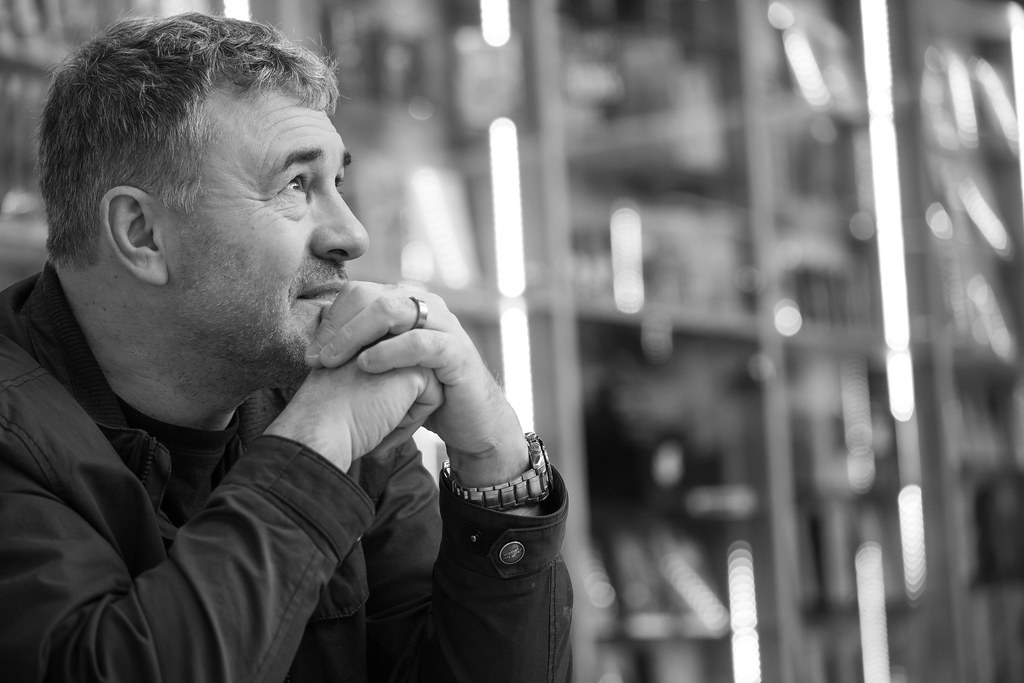
Do you like to discuss those aspects with your editors or do you prefer to finish a first draft and then show it?
To be honest with you I’m obsessive. I don’t write a draft. It’s a bit like watching the tide come in, I kind of do a few chapters, go back, polish, few chapters, go back, polish… and it grows slowly and I don’t usually show it to anyone until it’s done, by which time the front end is extremely polished and the back end maybe not quite so much. I’ve tried to change that to let my editors have a look at what I’ve got. I trust my editors, I mean both. The New York editor and the London editor. They are both brilliant women, and I trust them to give me a true opinion so I don’t mind them seeing it. But it’s a very personal journey and I don’t often feel like showing it someone else is really going to help that much. I will tend to want to just keep it until it’s done and when it’s done it won’t be a first draft. Some of it will be like a fifth or sixth draft, but even the ending will probably be I’ve gone over it two or three times. Then I’ll give it to the editors, and obviously they’ll come up with things that I have to change. But that’s because I never really knew any other way to do it. When you’re not published it is intensely isolated and you spend all your time on your own with the manuscript, and so I’m accustomed to that. I don’t feel the need for external input and I’m trying it out but it’s not really me.
And now you are working with the continuation of ‘Thin Air’.
There were a few things in Thin Air that never got explained, and my editor in fact had said to me, ‘this needs to come out. This is way too much information’. So there were a few things that were not addressed and I thought I really liked the character and the scenarios. I asked my editor ‘do you think there’s more than one book in this guy? And she went ‘Yes, I think I can see a couple of books’. So I went back and I took what I had that was left. You know, the DVD extras, and then tried to construct a story based around that and it’s coming on slowly because I’m not driven by the same imperatives as I was with Thin Air, because with Thin Air it was a kind of repulse to the whole bright eyed enthusiasm for Mars that you see around at the moment. And when you look at some of the people who are pushing this, you’re like ‘well, if you guys go to Mars, count me out’. It was all about a vision of what might be like if those other guys go to Mars. If the Republican right in America plus Elon Musk, Jeff Bezos, and Mark Zuckerberg go to Mars, it is like ‘my God, what is that going to be?’ It was an attempt to address that, to look at it and say ‘Are you sure?’ And I had a lot of fun with that, because Veil is a character that is not from there and he hates the place. So he’s a perfect conduit for all this sort of sour bitter criticism of the way things work. And he admits that back on Earth it’s not great. He hates the sort of the blind enthusiasm of the Martians. Yes, I had fun with that man, so I still want to do more with it but it’s a little more complicated now. Where to take the story? What to do with him? You can’t just reprise. You can’t just do the same stuff. Some people can, I wish I could. It’s like with the Kovacs novels, when Broken Angels came out. It’s a completely different kind of novel, obviously, and I know a lot of people were very upset because they thought that I would write an unending sequence of future noir detective stories with this character. For me it wasn’t about that, and even more than that, it was that I’d spent a lot of time hearing people talk about Kovacs and say, ‘well, you know, he’s a really tough guy and maybe morally ambiguous, but he’s got a code’. There is a will to misinterpret the character as so much nicer than he actually is, and so I think in many ways Broken Angels was a reaction to that. It was like, ‘okay, look. In Altered Carbon he was on holiday. Okay, so this is him at the day job’. It was interesting because I got to push the character into some directions I haven’t really explored in the first book and then the same thing with the third one as well. I think that’s important, so with the second Veil book I want to look at some other things that we didn’t maybe covered, not so much in the first book, so it’s not going to be the same kind of book, and just the way that Broken Angels wasn’t the same kind of book as Altered Carbon, but the context is the same. He’s still on Mars, he is still pissed off, still having sex with inappropriate people. I’m enjoying it.
If in the near future we come to settings like the ones in your novels, will you be surprised or will you say something like «I told you, bitches»?
Probably the latter. It’s difficult with the Kovacs books because they are centuries from here. I won’t see that luckily. But from time to time I look at the news and I think Market Forces wasn’t that far out. It’s amped up for effect and to sort of push the metaphor through, but in many ways a lot of the things that go on in that novel you can see them going on out there. They’re not quite the same, but the dynamics are there. On Mars I really don’t know because I think we still haven’t sort of bitten the bullet in terms of what it’s really going to mean to go to Mars. There’s this weird thing where people will just go and stay there. Really? I don’t know anybody who could pass the test to be an astronaut who would do that. Musk said ‘all I want is to die on Mars’. Okay you, go there. It should be easy to arrange. But the idea that you’ll find all of these competent, well trained, well balanced mature individuals who will just go and say ‘Yes, I’ll leave all this behind and never come back’… I just don’t see it. At best I reckon you could probably get people to go for sort of a 3 year turn around or something. I think there are a whole bunch of interesting novels to be written about setting them much closer to now, and you know, if I could be bothered to do the research on the technology, I might even write them, but about all the incredibly worrying psychological implications of being there. The fact that you’re literally not able to go outside ever unless you’re in a suit. It’s a completely alien environment in the genuine sense of that word. The gravity is different. The skyline is different. We don’t know what effect that will have on people. We’ve evolved to live on this planet with all of the physical aspects of that. We are used to a certain amount of sunlight, a certain amount of gravity, we are used to certain ways of seeing the world around us. And it’s not going to be like being in the Gobi desert. The skyline is going to feel weird because the planet is so much smaller. You are going to feel unsteady because the gravity is less. You’re going to look up at the sun and think, ‘bloody hell, that’s tiny’. I really think that they’re going to have some kind of deep psychological repercussions, and we don’t know what that will look like.
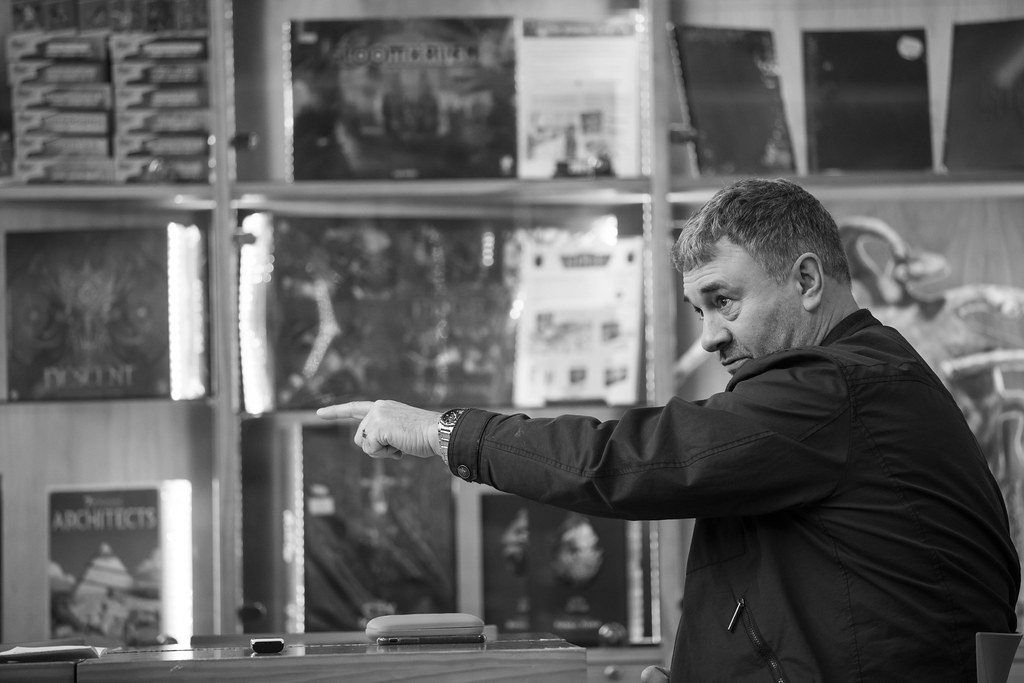
It is like getting into an anechoic chamber.
Yes, absolutely. And these are all things we haven’t even begun to address. They look at things like the issues of bone density and osteoporosis. And then there are various other issues to do with the sort of nourishing the body and so forth. But they haven’t even begun to think about the psychological implications of this. How it will impact people living for a long, long period of time in a world that they weren’t involved a little. I guess you can train people. We do train people as special forces to endure incredible levels of hardship and to just stay focused and stuff like that, but, as I understand the Musk vision, we’re not sending special forces to Mars. We’re sending families. You are going to take your two small children and go to live on this planet that may kill you. I think we will go. There’s no question. We will go, probably quite soon. I would like to live to see it. And we’re going back to the moon, obviously. I think that’s coming soon and they’re going to start building an international moon base, or a Musk moon base, so those places are coming. I don’t have any question about that. I think there’s going to be a very real crunch point. But do you know what I think will happen? And this is in Market Forces actually. I think initially they’ll have this big sort of fascination for it, and within 18 months people will be bored with it. And they’ll stop paying attention. Do you remember the movie Apollo 13? One of the things that really struck me about that movie was how the astronauts have been told ‘You’re going to have to put on a show, because people are bored with space exploration’. And there’s this rather bitter commentary that it’s like we have to come up here and die in order to get people to pay attention. And I think it will be the same thing. I think people will go to Mars and for a few months, maybe a couple of years it will be fascinating. People will watch the feeds on TV and on the Internet and they’ll be in the same way that some of the International Space Station astronauts have become sort of minor celebrities when they come home to their own countries. So they’ll still be that kind of thing, but I think it will disappear really quick. And it will be literally because the other thing will be like once you’ve gone and once you’ve established, that doesn’t seem to be any life here or ‘yeah, we found these microbes’. There is going to be a long, long time before anything of importance happens. You start to maybe be able to terraform or whatever it is. Maybe they discover some new compounds, but people are not going to be living it at the species level. It’ll be on the news, ‘And finally, scientists on Mars have discovered whatever’, and people will already be saying ‘look at that guy, that shirt he’s wearing is so sexist!’.
Like in the movie District 9, with aliens living in south african ghettos.
Exactly, and people stop caring about it. I think that’s what you’ll see. I think you’ll see an initial big enthusiasm followed by a sort of ‘hmmm…’. And it will finally drive home the realisation that this is not going to be like the movies. That this isn’t going to be like the old American West. This is actually going to be a bunch of people living there. I think what will resemble most closely are these guys in the camps in Antarctica. When do you ever hear about them? When was the last time you saw a news item about an Antarctica base? But I do think that the people who are pushing for this are looking to build a sort of an iteration of rapacious Republican right turbo Capitalism. I don’t know if you saw in the news that Musk is already talking about if they establish a base on the moon, it’s not going to obey Earth based law. It’s going to have self governing principles. So what is that going to mean? Already these guys are rejecting international law and they haven’t even got there yet. So once they get there, all bets are off. This is what scares me.












